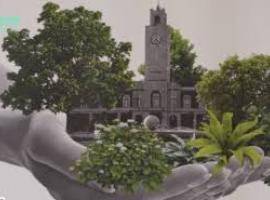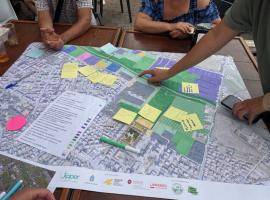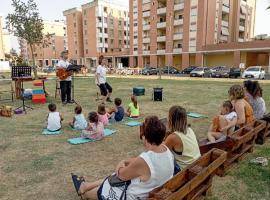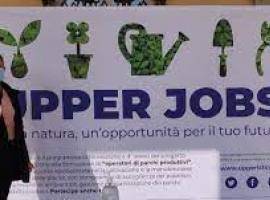The EU strategy's blueprint document (EC, 2020) highlights the value of nature-based solutions as multipurpose, no-regret solutions that are expected to be key in the new strategy. Nature-based solutions and related concepts are increasingly integrated in the global and EU policy frameworks that are relevant for resilience to climate change, biodiversity conservation and restoration and related areas. The urban agenda for the EU makes explicit reference to NBS also to 'ensure that the changes in urban areas (growing, shrinking and regeneration) are respectful of the environment, improving quality of life'. The European Commission recognizes that stakeholder involvement, dialogue and co-design of tools and measures are key to increase awareness, to tackle potential stakeholders' conflicts more effectively and to create social acceptance and demand for nature-based solutions. (EEA, 2021).
Being based on NBS the project is related to many EU policies (see Figure 2). The project activities can increase resilience and reduce social and environmental vulnerability; generate multiple social economic benefits and contribute to achieving climate change adaptation objectives and several multilateral environmental agreements and sectoral policy objectives; restore, maintain and improve ecosystem health; enhance governance of natural resources with respect to the use of biodiversity and ecosystem services; and empower people and provide jobs and business opportunities.

Figure 2 - Overview of nature-based concepts and their related EU policy sectors. Source: EEA Report No 1/2021
Although biodiversity is not explicitly addressed, the project is also coherent with the Action Plan for Nature, People and the Economy.
Moreover, the UPPER project has been also designed to support the ERDF Thematic Objectives and Investment Priorities, in particular:
- TO1/IP1.b, by developing links and synergies between enterprises, research and the public sector in particular promoting investment in Nature Based products and services development, technology transfer, social innovation, eco-innovation, public service applications, demand stimulation, networking, clusters and open innovation and applied research;
- OT3/IP3.a and OT9/IP9.c by promoting business oriented and social entrepreunership, facilitating the economic exploitation of NBS, including through business incubators;
- OT5/IP5.e by taking action to improve the urban environment, to revitalise cities, regenerate and decontaminate brownfield sites (including conversion areas) and reduce air pollution
- OT5/IP5.a by supporting investment for adaptation to climate change, including ecosystem-based approaches;
- OT8/IP8.b supporting employment-friendly growth through the development of endogenous potential as part of a territorial strategy, including the conversion of declining industrial regions
and enhancement of accessibility to, and development of, natural resources;
- OT9/IP9.a investing in green infrastructure which contributes to local development, reducing inequalities in terms of health status, promoting social inclusion through improved access to social and recreational services and the transition from institutional to community-based services.
Finally, UPPER is also consistent with the United Nations 2030 agenda for sustainable development. It promotes nature-based solutions across different sectors and policy areas and support their implementation as a means of contributing to transformative change. At the UN Climate Action Summit, 23 September 2019, New York, the 'Nature-Based Solutions for Climate Manifesto' (NBS for Climate Coalition, 2019) was launched with the support of more than 70 governments, the European Commission, private sector, civil society and international organisations and set ambitious priorities for unlocking the potential of nature-based solutions for climate action in the short term.


























